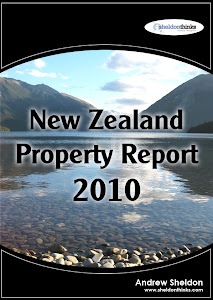New Zealanders hate Australians just as French hate English, Canadians hate the Americans. Its for this reason that Aussies love to piss them off. There is no better way to do this than to buy the family farm from under them. I note of late that the AUD-NZD exchange rate is back to the high levels set in early 2006 of $1.25, and by all appearances it looks like going as high as $1.33 to the NZD. This weaker outlook for the NZD is of course honey for Australians.
Nevermind the people, NZ holds a lot of appeal for Australians. The country has fewer people than Australia so its even cleaner and relaxed than Australia. NZ has also picked up a lot on the cultural side as well. There are now a lot of nice restaurants and pubs, even if eyes are polarised are polarised on TV screens. I can hear them saying 'You would be too if you were winning the footy'. Well I dont care about such things. The other pressing reason for buying NZ property is:
1. The grand scenery - NZ is one of the most beautiful places - no thanks to the localsNevermind the people, NZ holds a lot of appeal for Australians. The country has fewer people than Australia so its even cleaner and relaxed than Australia. NZ has also picked up a lot on the cultural side as well. There are now a lot of nice restaurants and pubs, even if eyes are polarised are polarised on TV screens. I can hear them saying 'You would be too if you were winning the footy'. Well I dont care about such things. The other pressing reason for buying NZ property is:
2. The baby bubble burst - all these retiring NZ'ers - some of them are likely to head home, and those that aren't going yet are at least likely to sell their homes in the UK, Japan and Australia to buy now as the exchange rate deteriorates. Mind you its more the AUD is strong than NZD is weak. But Australia is the 2nd biggest home to NZ'ers (and sheep). You see the correlation dont you. You dont see Aussies going to NZ for the sheep. No correlations there.
With NZ interest rates fairly high, it makes me wonder if there is an opportunity in foreclosed properties in NZ, with the other opportunity to capture the benefits of a strong AUD. The AUD is yet to reach its highest, but it might make sense to start looking now. I wonder if there is any problem borrowing money in AUD to buy property in NZD. I have not heard of this. I can tell you that I was handing out $A notes in Auckland because the country felt the same as Australia. We even share banks.
-----------------------------------------------With NZ interest rates fairly high, it makes me wonder if there is an opportunity in foreclosed properties in NZ, with the other opportunity to capture the benefits of a strong AUD. The AUD is yet to reach its highest, but it might make sense to start looking now. I wonder if there is any problem borrowing money in AUD to buy property in NZD. I have not heard of this. I can tell you that I was handing out $A notes in Auckland because the country felt the same as Australia. We even share banks.
Andrew Sheldon www.sheldonthinks.com


